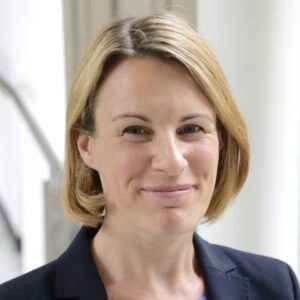Posted By: Sara Cullinan, PhD, Deputy Editor, AJHG
 Each month, the editors of The American Journal of Human Genetics interview an author of a recently published paper. This month we check in with Anna Middleton to discuss her paper, “Global Public Perceptions of Genomic Data Sharing: What Shapes the Willingness to Donate DNA and Health Data?”.
Each month, the editors of The American Journal of Human Genetics interview an author of a recently published paper. This month we check in with Anna Middleton to discuss her paper, “Global Public Perceptions of Genomic Data Sharing: What Shapes the Willingness to Donate DNA and Health Data?”.
AJHG: What prompted you to start working on this project?
Anna: I could see that policy was being written about genomic data sharing without an explicit voice from public audiences. I feel very passionately that the aim of science is to serve society in some way and the only way to do this is to see science and society as being in partnership with each other. We don’t know what public audiences want unless we ask them directly and so that was what we did in the Your DNA Your Say study.
AJHG: What about this paper/project most excites you?
Anna: The scale and reach of the collaborations really excite me in this project. We have partnered with social scientists, genetic counsellors and policy makers in Japan, India, South America, Ghana, Russia, China as well as many other countries – all with the shared vision of finding out what their local public audiences think about genomic data sharing. As far as we know, this is the largest public survey ever delivered on genomics and it has taken us 4 years to pull this together. We are now exploring how to keep momentum going and are thinking about the future together – this is very exciting – a network of social scientists from across the world, all gathering empirical data on how genomics and society are interacting.
AJHG: Thinking about the bigger picture, what implications do you see from this work for the larger human genetics community
Anna: This work shows that social scientists have a place at the table in contributing to outcomes from the larger human genetics community. We aim to help the science community be able to evidence that their work has societal benefit, and as part of this we offer a voice of the public to the science community to help shape future work and policy. We also can offer a temperature gauge on when public audiences are feeling disconnected, confused or unhappy, so that the human genetics community knows what they need to address.
AJHG: What advice do you have for trainees/young scientists?
Anna: Remember that every data point or sample that you research has a human being attached to it; and be mindful that they have thoughts and feelings about what you do with this. See yourselves as public servants for wider society as your science will ultimately have an impact, however big or small, on people.
AJHG: And for fun, tell us something about your life outside of the lab.
Anna: After years of over-working, I’ve made a really conscious effort to maintain a healthy work-life balance. I bought a horse and now go horse back riding around the English countryside whenever I can. I’m so grateful for this opportunity to switch off, breathe fresh air and re-set.
Anna Middleton, PhD, MSc, RGC is a professor at the Wellcome Sanger Institute; she is also a professor/affiliate lecturer at the University of Cambridge. She has been a member of ASHG since 2020.
